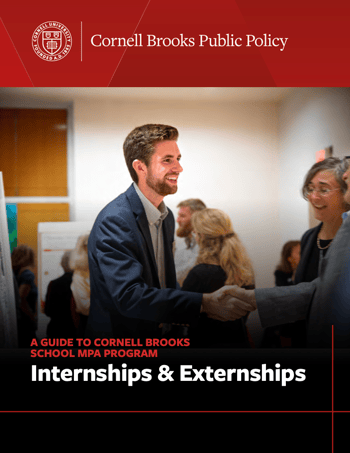Understanding the Science Behind Learning-By-Doing in Cornell's MPA

At Cornell University, we believe in the power of hands-on learning, which is why we offer a variety of ways to enhance your Master of Public Administration (MPA) degree through tangible, real-world experiences. We're here to dive into the science behind hands-on learning and how getting an MPA while learning-by-doing will enable you to enter the workforce with marketable, practical skills.
How the Brain Responds to Hands-On Learning:
Learning mechanisms in the brain are triggered by practice and repetition. The more connections between neurons are formed, the more we learn, and the more information we retain. When the brain is given multiple avenues through which to connect to an idea, an action, or a theory, the more opportunities there are for neurons to fire and learning to occur. When taken together, the full range of senses helps students learn material in a more concrete manner.
Thanks to our complex brains and conscious train of thought, we are able to learn through the mental reporting of facts – which is what happens when you memorize the lyrics to your favorite song – but it’s usually not as efficient as learning by using the information in the real world.
Studies show that only certain parts of the brain activate during different sensory learning experiences; Therefore, visual learning will activate a different part of the brain than would auditory learning, for example. A report by the University of California, cited in the journal “Trends in Cognitive Sciences,” states that “People generally remember 10 percent of what they read, 20 percent of what they hear, 30 percent of what they see, and 50 percent of what they see and hear.” When all the senses are used in a hands-on experience, retention rates can reach as high as 75 percent. Combining the senses, therefore, through comprehensive experiential learning is beneficial to students regardless of personal learning style.
How Cornell's MPA Promotes Experiential Learning:
Cornell’s MPA is a two-year graduate program through which we prepare individuals for management and leadership careers in public service. Getting an MPA provides graduates with a solid foundation of core coursework in management, economics and finance, and quantitative analysis.
Our students often say that they’re drawn to Cornell’s MPA because of the emphasis we place on experiential learning, with hands-on opportunities offered both inside and outside of the classroom — including public administration internships. In addition to internship and externship opportunities, as well as numerous courses with experiential learning components, we offer two intensive consulting courses that are client-based. Graduates regularly cite their consulting engagements as key in helping them develop the skill set they need to be successful in their careers.
MPA Internships & Externships:
In Cornell’s MPA program, there are several options for fulfilling the Practical Experience requirement for the MPA. Real-world consulting opportunities, internships, off-campus study, and Capstone experiences help you develop the skill set you need to be successful in your future careers.
Summer Internships: To fulfill the Practical Experience component of the Cornell MPA degree, most students choose to complete an internship in the summer between the first and second year of study, or an externship while enrolled in one of CIPA’s off-campus semester programs. Internships are available both in the United States and abroad in public, private, and nonprofit organizations across the field of public affairs. Some of our recent CIPA Fellows have been placed in internships with the following representative organizations (and many others!):
- Amazon
- Atkinson Center for a Sustainable Future, Cornell University
- Deloitte Tax, LLP
- International Labour Organization
- New York City Office of Management and Budget
MPA Externships: Our Externship Programs allow you to gain professional experience in various government agencies, private sector firms, or non-government organizations. If you are interested in pursuing this opportunity, you should begin planning this with your academic advisor as early as possible. Opportunities for off-campus study include Washington D.C.; New York, NY; Mysore, India; and Albany, NY.
Capstone Project: To fulfill the Professional Writing Requirement of the MPA degree, most students participate in the CIPA Capstone, an in-depth, semester-long program designed for second-year MPA students. For each Capstone project, students form consultancy teams that propose relevant and actionable solutions to well-defined policy or management problems posed by client organizations. The experiential learning and teamwork required in each Capstone project will enhance fellows’ abilities as public affairs professionals and leaders.
Connect with Us!
Are you ready to experience real-world learning while tackling some of the world’s most complex policy challenges? You’re in the right place. We are looking for students of exceptional quality who have the analytical, leadership and communication skills necessary to succeed in a career serving the public in government, nonprofit or for-profit sectors. Get started today!



